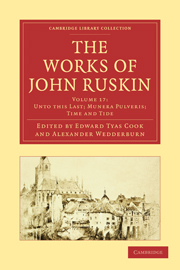Book contents
- Frontmatter
- Contents
- LIST OF ILLUSTRATIONS
- INTRODUCTION TO THIS VOLUME
- PART I “UNTO THIS LAST” (1860)
- PART II “MUNERA PULVERIS” (1862, 1863)
- PART III “TIME AND TIDE, BY WEARE AND TYNE” (1867)
- APPENDIX: LETTERS AND PAPERS ON ECONOMIC SUBJECTS 1863–1873
- I LETTERS ON “MUNERA PULVERIS” (1863, 1875, 1877)
- II THE DEPRECIATION OF GOLD (1863)
- III LETTERS ON THE LAW OF SUPPLY AND DEMAND (1864, 1873)
- IV LETTERS ON WORK AND WAGES TO THE “PALL MALL GAZETTE” (1865)
- V LETTERS ON SERVANTS AND HOUSES TO THE “DAILY TELEGRAPH” (1865)
- VI LETTERS ON RAILWAYS AND THE STATE (1865, 1868, 1870)
- VII SPEECHES ON TRADES UNIONS AND STRIKES (1868)
- VIII EMPLOYMENT FOR THE DESTITUTE POOR AND CRIMINAL CLASSES (1868)
- IX LETTERS ON ROMAN INUNDATIONS (1871)
- X LETTERS ON “HOW THE RICH SPEND THEIR MONEY”(1873)
- XI HOME, AND ITS ECONOMIES (“CONTEMPORARY REVIEW,” MAY 1873)
- Plate section
II - THE DEPRECIATION OF GOLD (1863)
Published online by Cambridge University Press: 05 November 2011
- Frontmatter
- Contents
- LIST OF ILLUSTRATIONS
- INTRODUCTION TO THIS VOLUME
- PART I “UNTO THIS LAST” (1860)
- PART II “MUNERA PULVERIS” (1862, 1863)
- PART III “TIME AND TIDE, BY WEARE AND TYNE” (1867)
- APPENDIX: LETTERS AND PAPERS ON ECONOMIC SUBJECTS 1863–1873
- I LETTERS ON “MUNERA PULVERIS” (1863, 1875, 1877)
- II THE DEPRECIATION OF GOLD (1863)
- III LETTERS ON THE LAW OF SUPPLY AND DEMAND (1864, 1873)
- IV LETTERS ON WORK AND WAGES TO THE “PALL MALL GAZETTE” (1865)
- V LETTERS ON SERVANTS AND HOUSES TO THE “DAILY TELEGRAPH” (1865)
- VI LETTERS ON RAILWAYS AND THE STATE (1865, 1868, 1870)
- VII SPEECHES ON TRADES UNIONS AND STRIKES (1868)
- VIII EMPLOYMENT FOR THE DESTITUTE POOR AND CRIMINAL CLASSES (1868)
- IX LETTERS ON ROMAN INUNDATIONS (1871)
- X LETTERS ON “HOW THE RICH SPEND THEIR MONEY”(1873)
- XI HOME, AND ITS ECONOMIES (“CONTEMPORARY REVIEW,” MAY 1873)
- Plate section
Summary
[The following letters (1 and 2) were elicited by an article in the Times of September 23, 1863, upon the panic as to the depreciation of gold caused by the fresh discoveries of the metal in California and Australia. Ruskin was at Chamouni at the time, and his father seems to have written asking his opinion on the whole subject. Ruskin's reply is here printed (1). Later, when he had seen the article in the Times, he wrote a letter to that journal (2).]
A LETTER TO J. J. RUSKIN
Chamouni, September 27 [1863].
I have yours of the 24th, but not the Times of 23rd spoken of. But if I had, it would be useless, for I cannot put the facts of the currency more clearly than I have already in Fraser, December '62, p. 744: see especially the note. Of course gold is only precious as long as people think it so, and it loses its value either when more of it is found, or when other things diminish in quantity. Every destruction of a ship's cargo or warehouse load, in the American war — every lost harvest in Poland—every robbery or arson in Calabria, diminishes the value of every piece of gold in the world. Increase the destruction to the rate of it in a shipwreck or famine, and gold becomes entirely worthless; it does not matter how much of it you have, if you can get nothing to eat with it, nor save your life with it.
- Type
- Chapter
- Information
- The Works of John Ruskin , pp. 488 - 498Publisher: Cambridge University PressPrint publication year: 2010First published in: 1905

